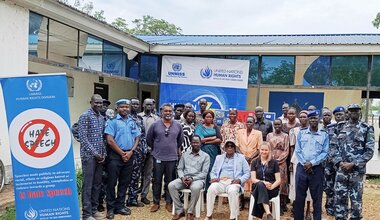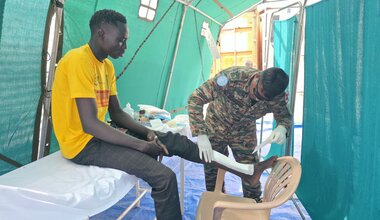People slowly returning to Bor
11 February 2014 - Although the city has normalized after recent fighting, less the 2,000 people have returned to the Jonglei State capital Bor, according to aid agency officials.
“Returnees are coming back from different directions,” South Sudan Red Cross Director David Gai told UN Radio Miraya. “A few families are crossing (the While Nile River) from Awerial (Lakes State).”
His agency had begun yesterday to register families returning to learn about their needs and draw up a plan for assistance, Mr. Gai said.
“We registered about 113 families yesterday,” he said. “According to my observation … Bor city is very large (about 220,000 people), but I can estimate that about 1,500 (people) have returned.”
He said his team in Bor was small, as most of the SSRC were working across the river in Awerial County, Lakes State, distributing food and non-food items to the estimated 75,000 internally displaced persons there.
“We will start with registration … and then some of our volunteers will be involved in cleaning up … the city itself,” Mr. Gai said.
The SSRC had donated body management material to the Ministry of Health, he said.
“The dead bodies have to be picked up and kept safely for the burial process,” he said. “As we are on the ground, now we are able to work together closely with the authorities and the Ministry of Health to see how we can support them (with the bodies).”
The SSRC director said he had been inspecting the streets to determine the number of bodies still present. “I can see that about 69 bodies are still … in body bags and are lying on the street to be collected.
Mr. Gai noted the “very alarming humanitarian situation” in islands people had fled to on the White Nile River.
“You can see about 400 families have been caught up in the islands in Twic East (County),” he said. “These families don’t have anything and they could not even afford a boat to cross to Awerial.”
Two days ago, he had spoken with a chief in Pariak, who said he knew of about 200 families who were still hiding in islands with no food or clean water, Mr. Gai said.
“They are really vulnerable and they are not able to take their families to Awerial or even to Bor,” he said. “So this is the real situation we have seen and I think it … needs urgent attention.”
 UN
UN United Nations Peacekeeping
United Nations Peacekeeping





